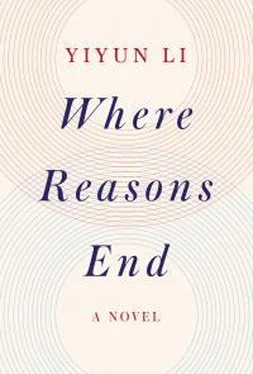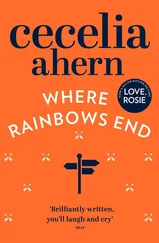But he did not say anything.
Isn’t it strange that her first thought was someone’s grandson, I said after the man and the woman exited the car.
She just met her first grandchild, Nikolai said.
I had missed that part. We went into the tunnel. I wondered if the noise still bothered him.
I can hear you fine, he said.
Oh, I said. There is one thing that troubles me. I can’t find all those poems you wrote.
Or those I will write.
Touché, I said. I then explained that someone had asked if I had enough of his poetry to make a chapbook.
Chap, ChapStick, chapman, chapbook, he said. All sound small to me. Like you’re going to make—what did they call it in the old time—a miniature of my mind.
How I loved that his ambition and conceit would remain as young as he was. They would be handmade, like what you did in bookbinding, I said.
Those notebooks have blank pages.
Not all books have to be blank, I said. Everyone agrees you are a beautiful poet.
Ha, from reading those doodlings I sent you when I was a kid? he said. You don’t understand poetry.
You as me, your mother, or you as the world?
You as my mommy, he said. Nikolai might be the only sixteen-year-old to still call his mother Mommy. No offense, but your taste is not to be trusted, he said.
I laughed. He had said the same thing when we had been in a shop in Edinburgh, choosing woolen and cashmere scarves for him.
Those scarves are mine now, I said.
Like pass-me-ups?
You don’t mind my wearing them?
I haven’t worn them so they’re not mine yet. But I do mind, he said, you or anyone reading my poetry.
I told him about an exhibition of Philip Larkin I had seen in England. There were covers of Larkin’s journals, the insides taken out and burned in a fireplace the day after his death.
I applaud that as much as you do, Nikolai said.
The key is to have someone you trust agree to live longer, I said.
But I can’t entrust my poetry to anyone, he said.
I thought about the people in the world who would all live longer than he. Would I trust any of them? Would I trust myself?
It’s not your fault, he said.
If you use fault in the sense of wrongdoing, I said, no, it’s not. But the root of the word fault came from to disappoint, to deceive.
Nikolai waited for me to go on. He was not often this patient in hearing me out.
Who can say to love doesn’t also mean to disappoint and to deceive? I said.
Those who disappoint or deceive don’t always do so from love, he said.
That, my child, doesn’t help a parent. If the job description of parenting, I thought, had come with the requirement to disappoint and to deceive, how many of us would have set out with guiltless hope in the first place?
Or hopeless guilt? he said. But you’ve decided that in this world we don’t abide by the rules that bind a child and a parent.
The line between self-deception and willpower is often blurred, I said.
I inherited both from you, didn’t I? he said. It’s not your fault, though.
Willpower was among his qualities I would remember. When he was in fifth grade, he had had trouble sleeping. Later he told me, when we were arguing, that whatever we had suggested had been of little help. I went to bed at nine and willed my body to stay still and my brain to stop thinking, he had said. That was how I solved my insomnia and that will always be the way I solve my problems. I can’t rely on anyone but my own willpower.
The line between willpower and arrogance is blurred, too, I said.
That, unfortunately, cannot be changed, he said. Give will some power and it turns blind. Just as people with power become so full of themselves they can’t see their own toes.
But then when does willpower see?
Willpower doesn’t have eyes to see, he said. Wishy-washiness has eyes, though. Too many. Like Argos.
Nikolai used to call me wishy-washy because he had liked the sound of it.
We can’t then let willpower lead us, I said.
You can’t, he said.
But how else does one live if not by willpower, when day after day after day after day a child hides himself? I read him a stanza from a Larkin poem:
What are days for?
Days are where we live.
They come, they wake us.
Time and time over.
They are to be happy in:
Where can we live but days?
Days are not the only place where we live, Nikolai said.
Time is not the only place where we live, I said. Days are.
I don’t have to have days to live now.
And yet I have to live in days, I said.
I’m sorry, he said.
Days: the easiest possession, requiring only automatic participation. The days he had refused would come, one at a time. Neither my allies nor my enemies, they would wait, every daybreak, with their boundless patience and indifference, seeing if they could turn me into a friend or an enemy to myself.
Never apologize, I said, for what you have let go.
3
The Trespassers
I’ve been trying to find that poem by Elizabeth Bishop, I said. Remember, the one you wrote about?
I don’t, Nikolai said.
The first week of sixth grade, I said. You wrote how the poem made you realize memory turned the places we traveled to into different colors for you.
Purplish gray for Croatia, he said.
Yes!
Gold and silver for Paris.
Some odd choice for Berlin, I said. Some odder choice for Beijing. What colors were they?
I don’t remember.
Which poem is it?
I don’t remember that, either.
What are the rules of knowing and remembering for him now? For weeks I had been reading through Bishop’s poems, but none of them looked like the right one. Could he not name the poem, I thought, unfettered by memory?
Unfettered, he said. You chose the wrong word.
I looked up the word. He must have acquired a dictionary’s worth of knowledge.
If memory were a fetter, he said, many people would envy me.
Why?
Each day they live makes the fetter more unbreakable than the day before.
What if, I thought, that is life’s necessity?
Still, I said, aren’t you able to know the poem even if you can’t remember?
It doesn’t work the way you imagined.
Why not?
Something in the past, he said, and so specific. No, knowing is not about that.
In other words, I said, omniscience does not apply retrospectively. I kept having to refrain from saying: where you are.
Dilemmas are ubiquitous, he said, wherever you are.
Di-lemmas: two assumptions. Omniscience and memory: both questionable.
If one has to choose? I asked.
Memory is like eye color, he said. You always have it.
Yet one can choose to shut one’s eyes, I thought.
That doesn’t change your eye color, he said. Omniscience is like the ability to write poetry. Not all people are born with it.
Can one not acquire it? I asked.
Can you write poetry?
I thought about the question hard. No, I conceded. But I do like to use omniscient narrators in fiction.
Ha. That sounds like my friends who bring store-bought cookies to the bake sale.
I feel unfairly judged, I said.
There is a perfection in omniscience that you don’t have and don’t understand, he said.
Or I don’t believe in perfection?
It’s lazy-minded of you to say you don’t believe in something that you don’t understand.
I thought about the things I didn’t understand. These days they often came back to Nikolai. Before daybreak I had remembered a little song he had made up when he was six and his little brother, J., was three, which they sang in tandem when having a bath together:
Happy-go-lucky fish
Happy-go-lucky fish
Message-in-a-bottle fish
Читать дальше












